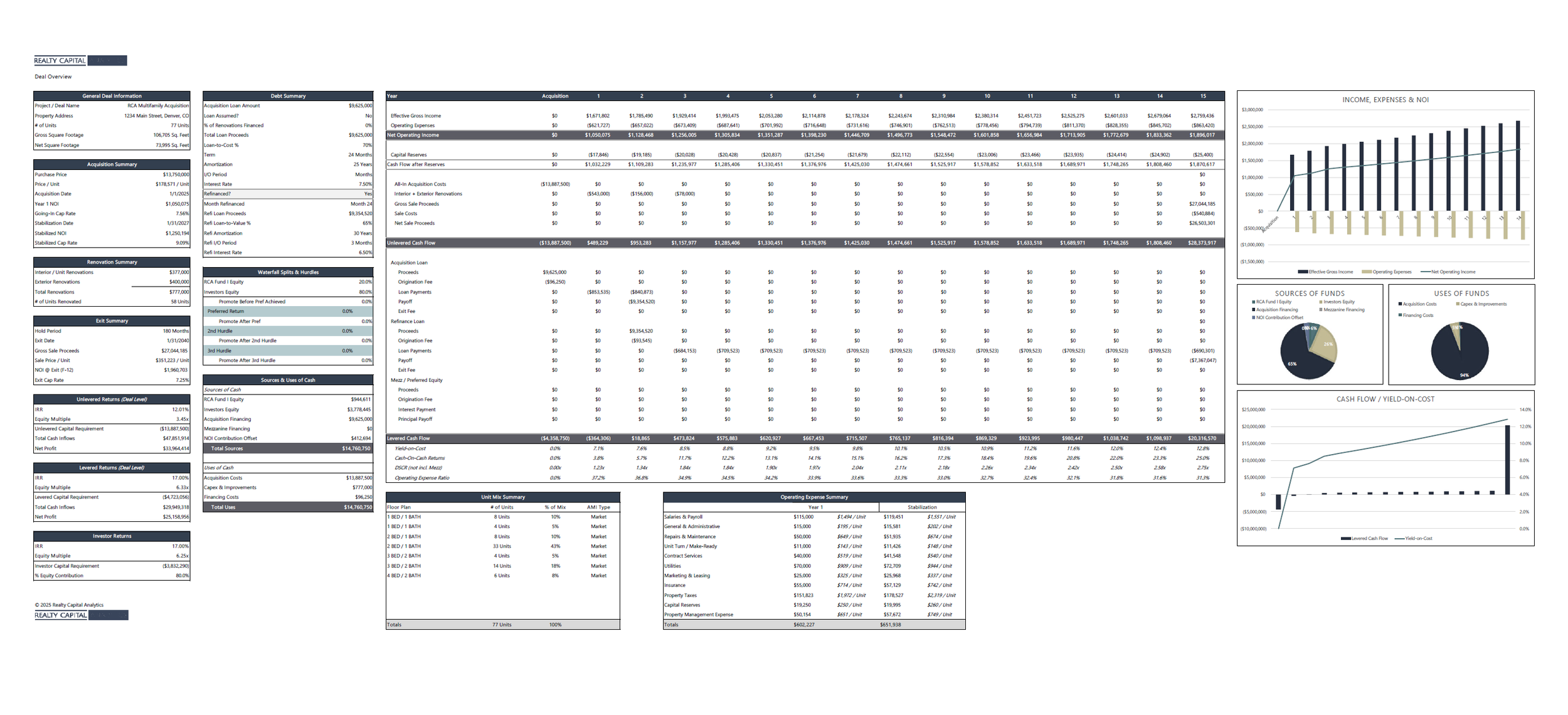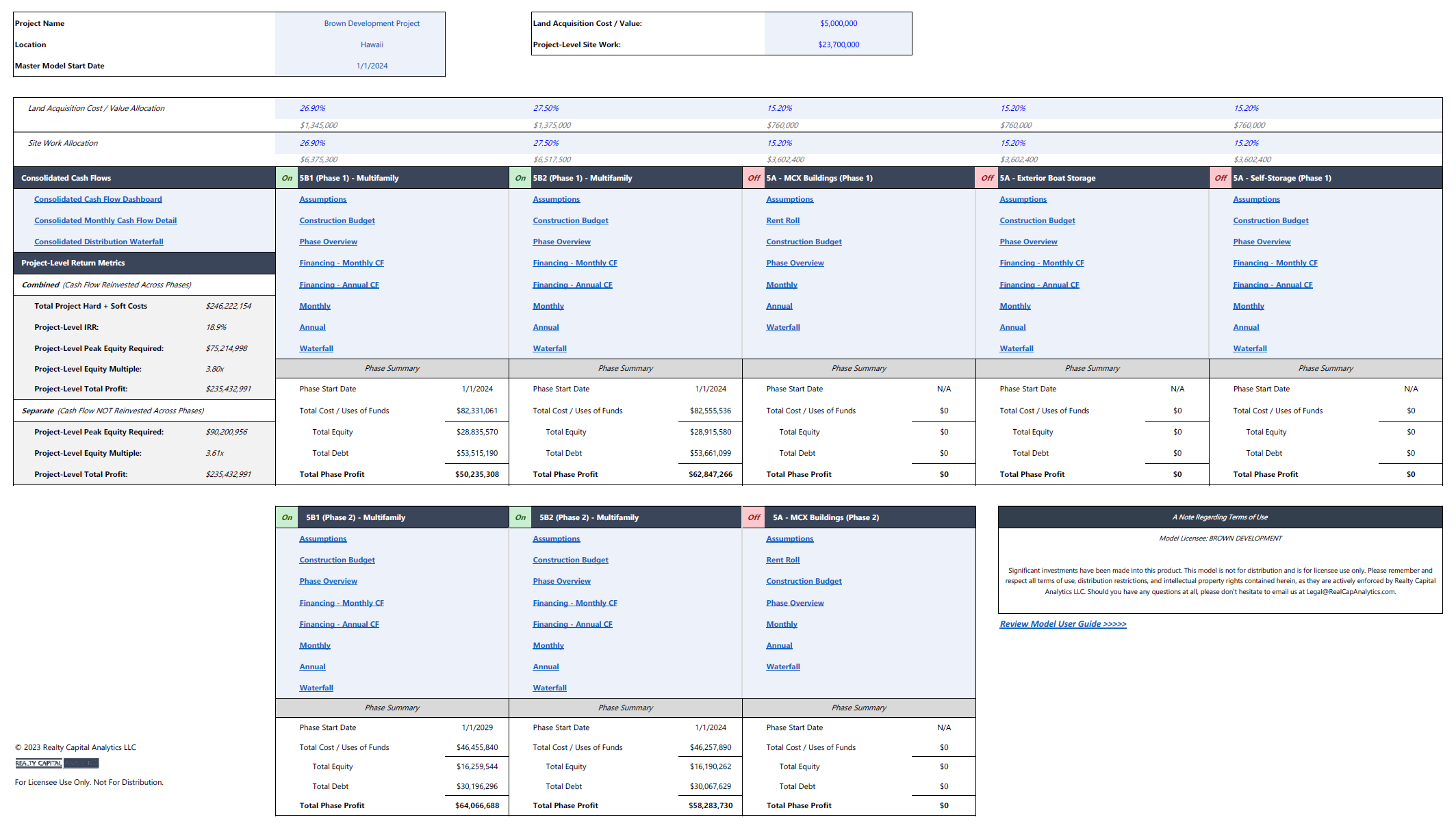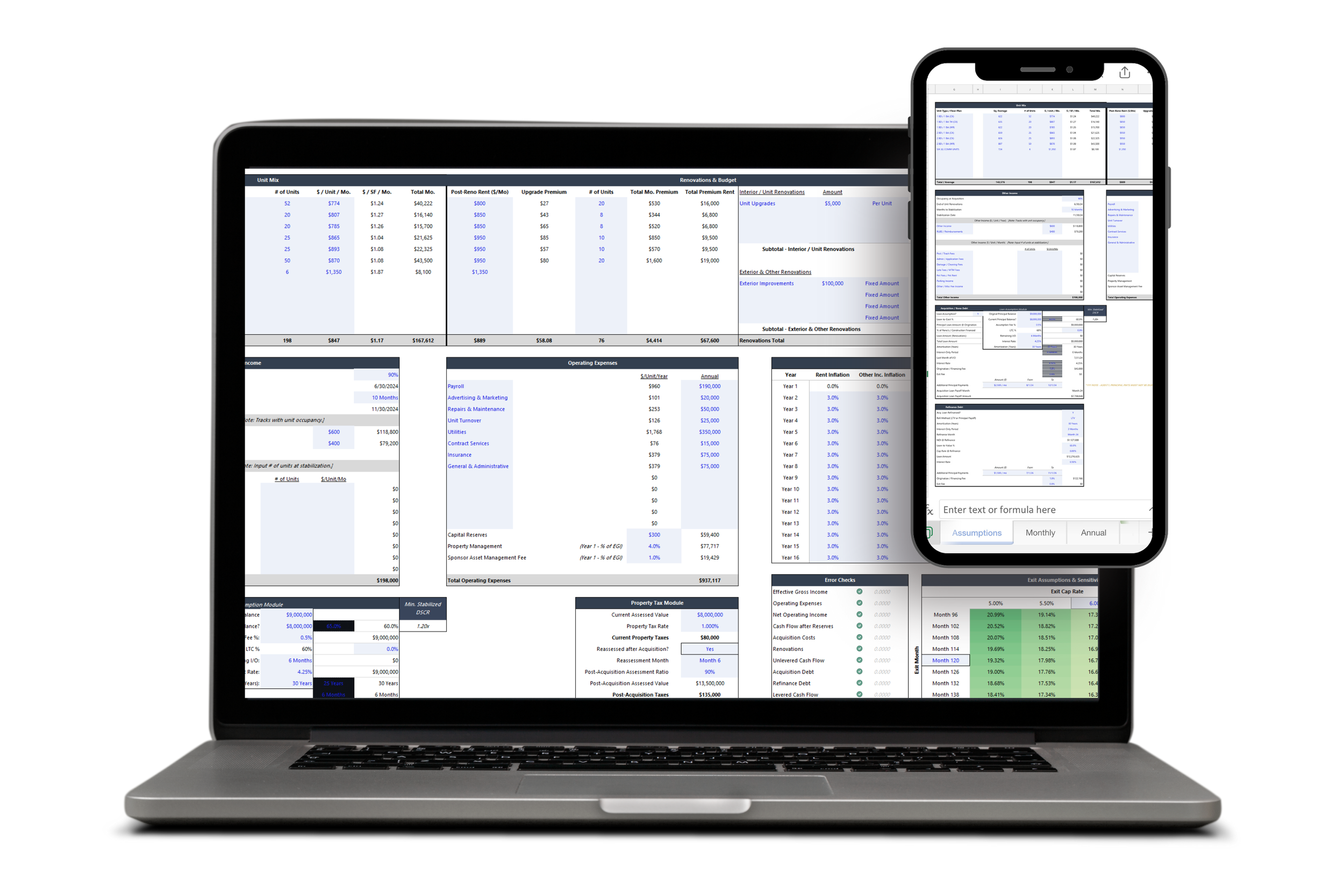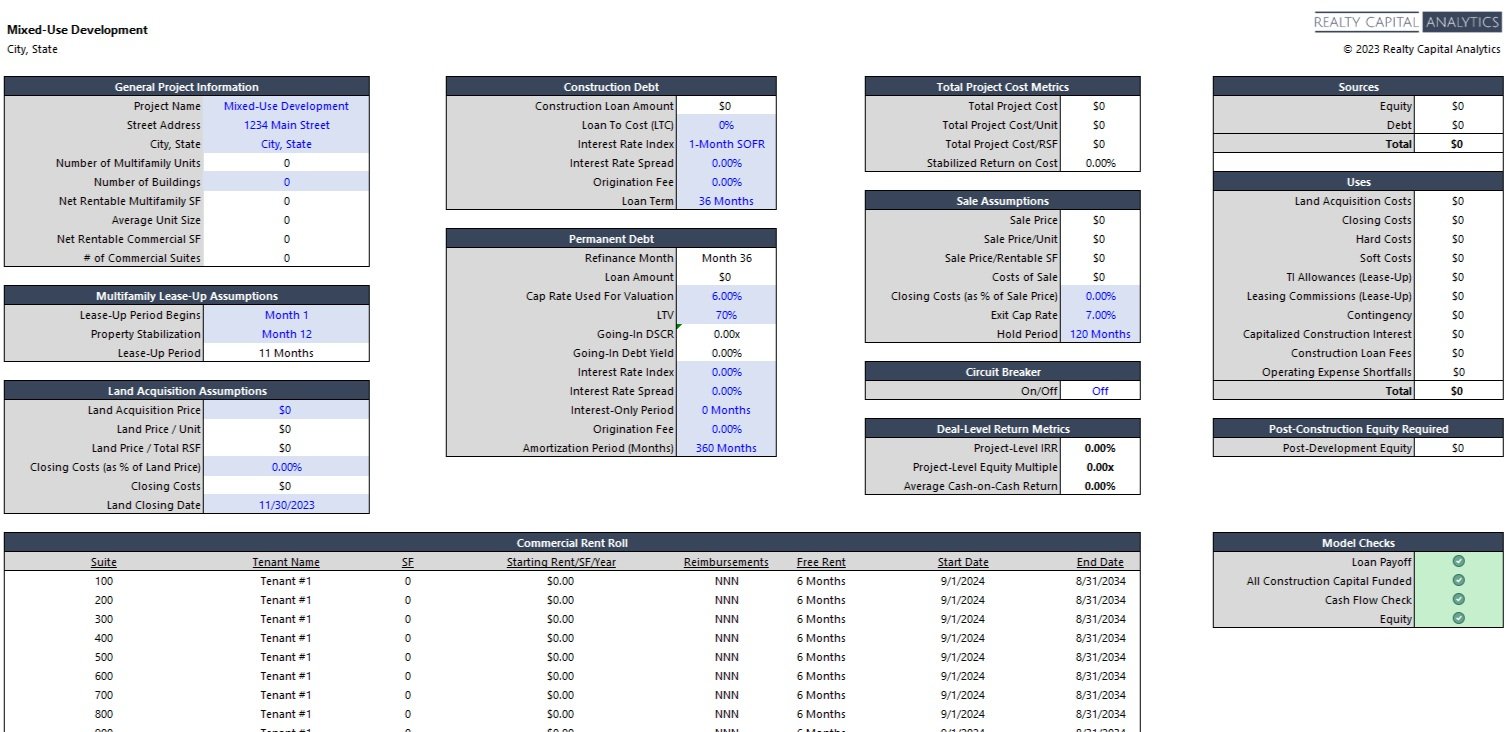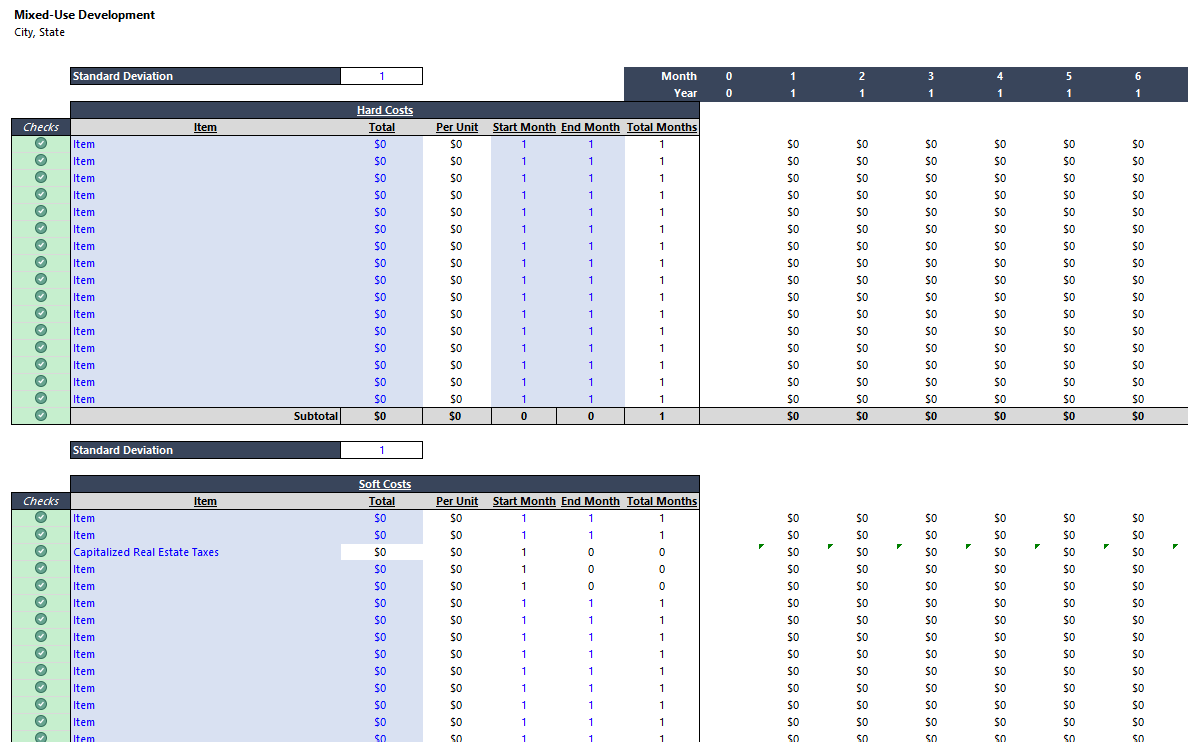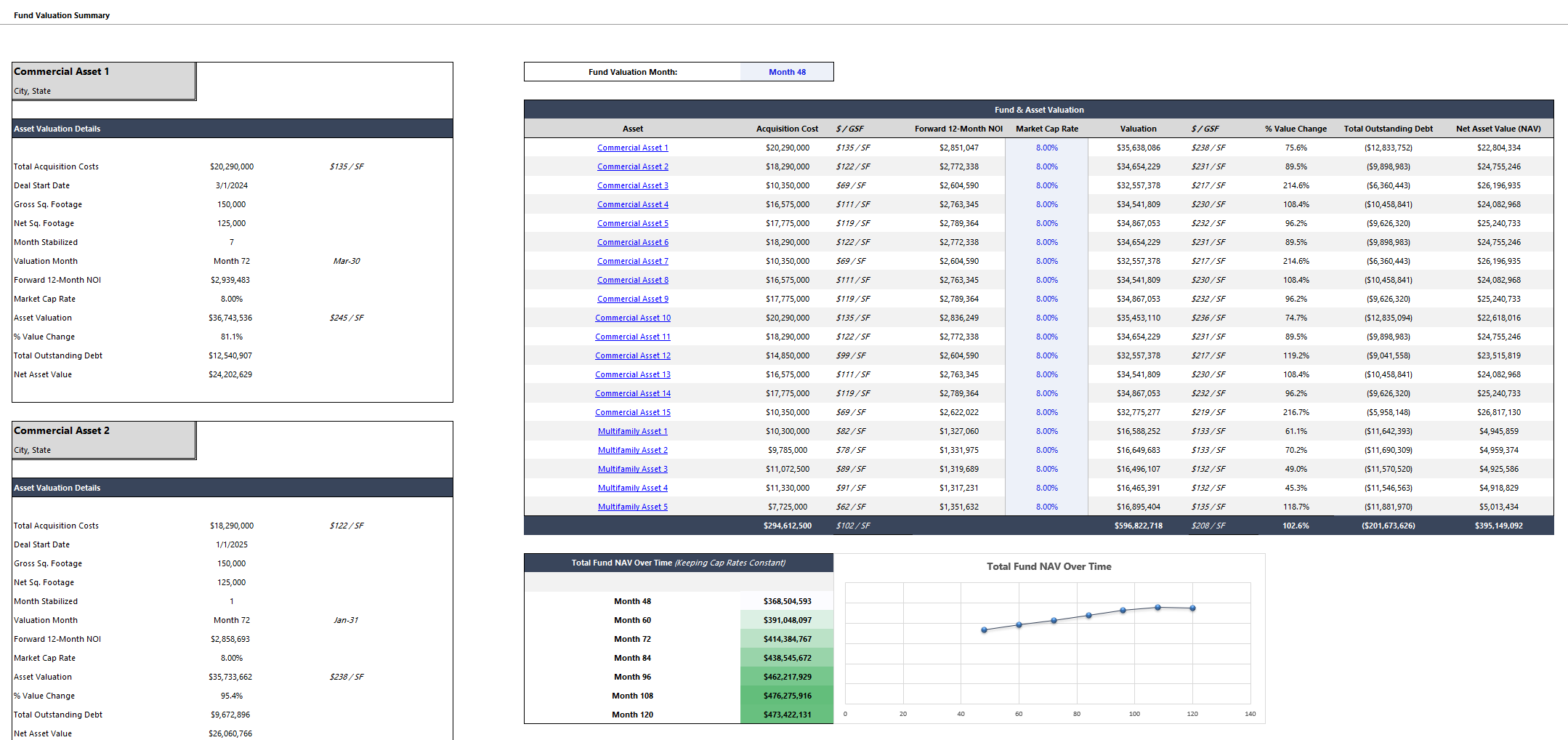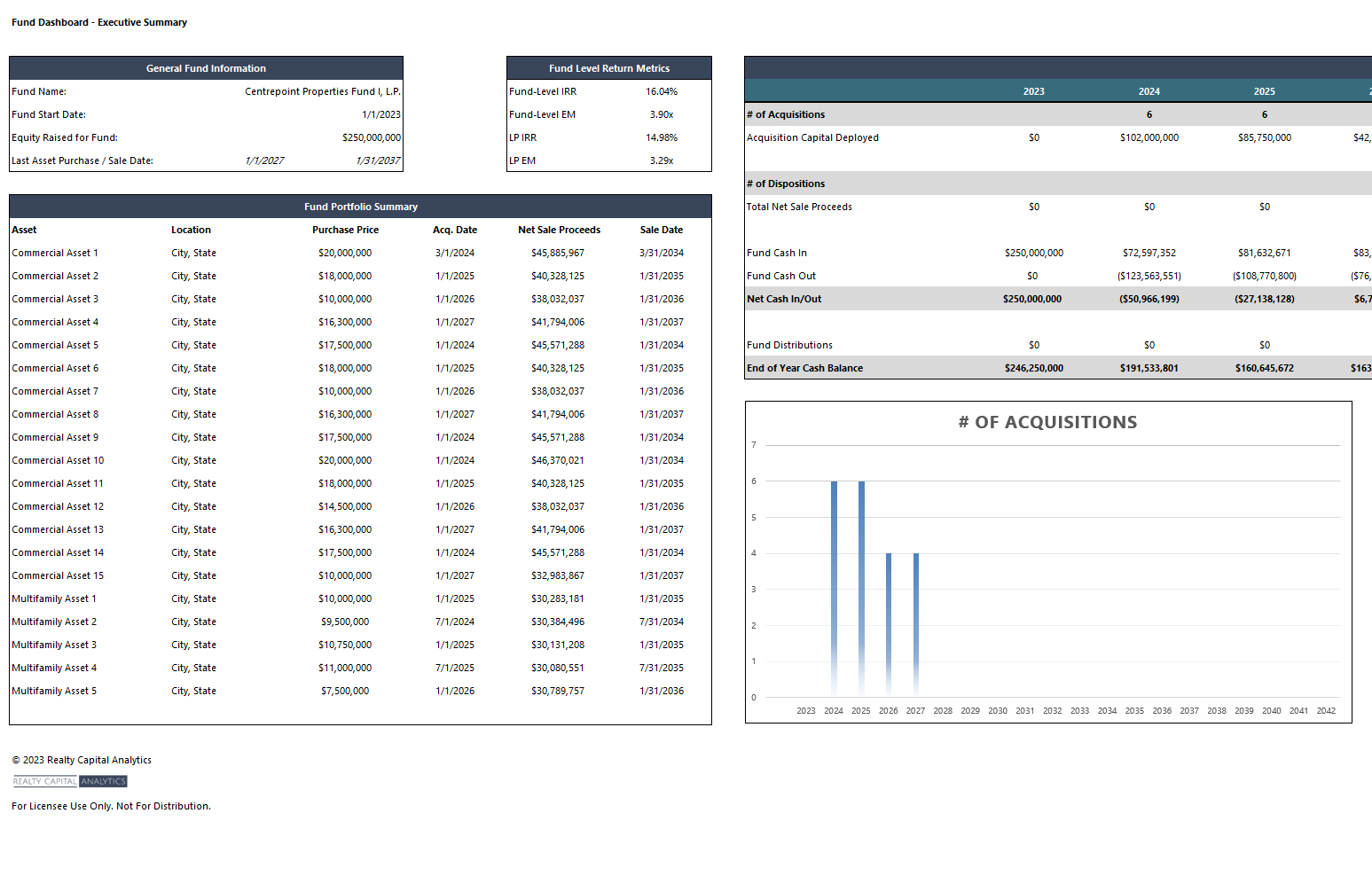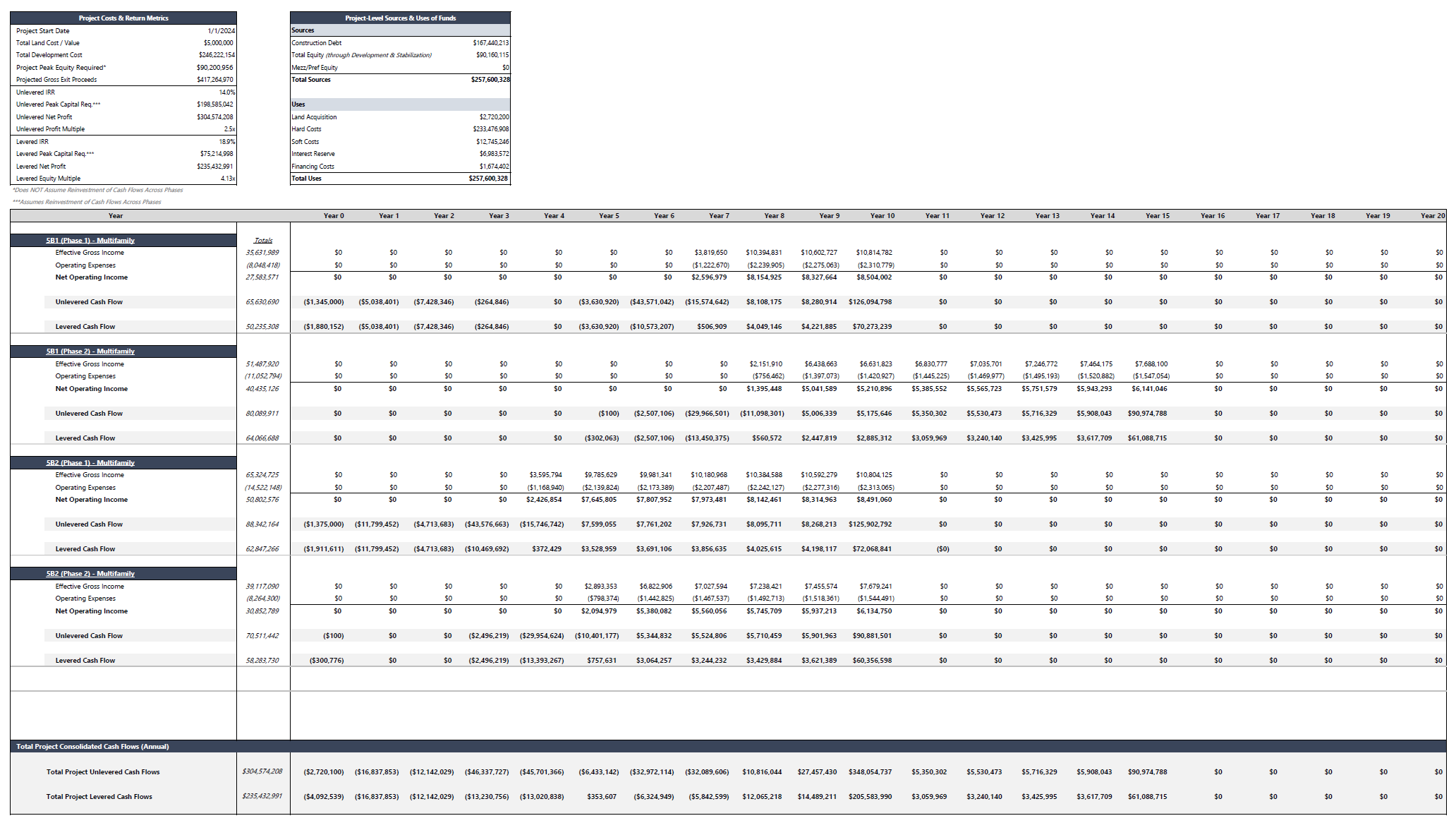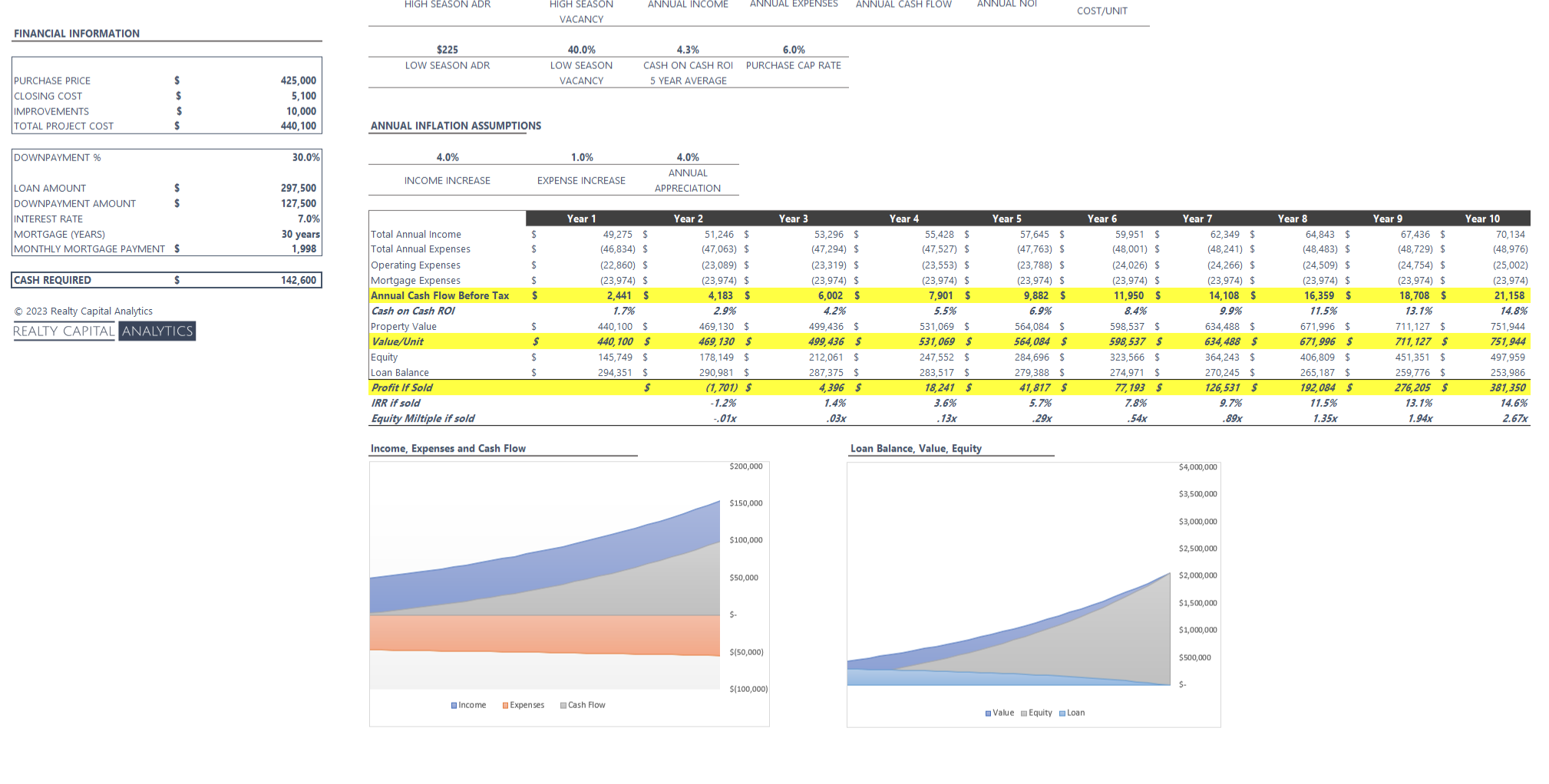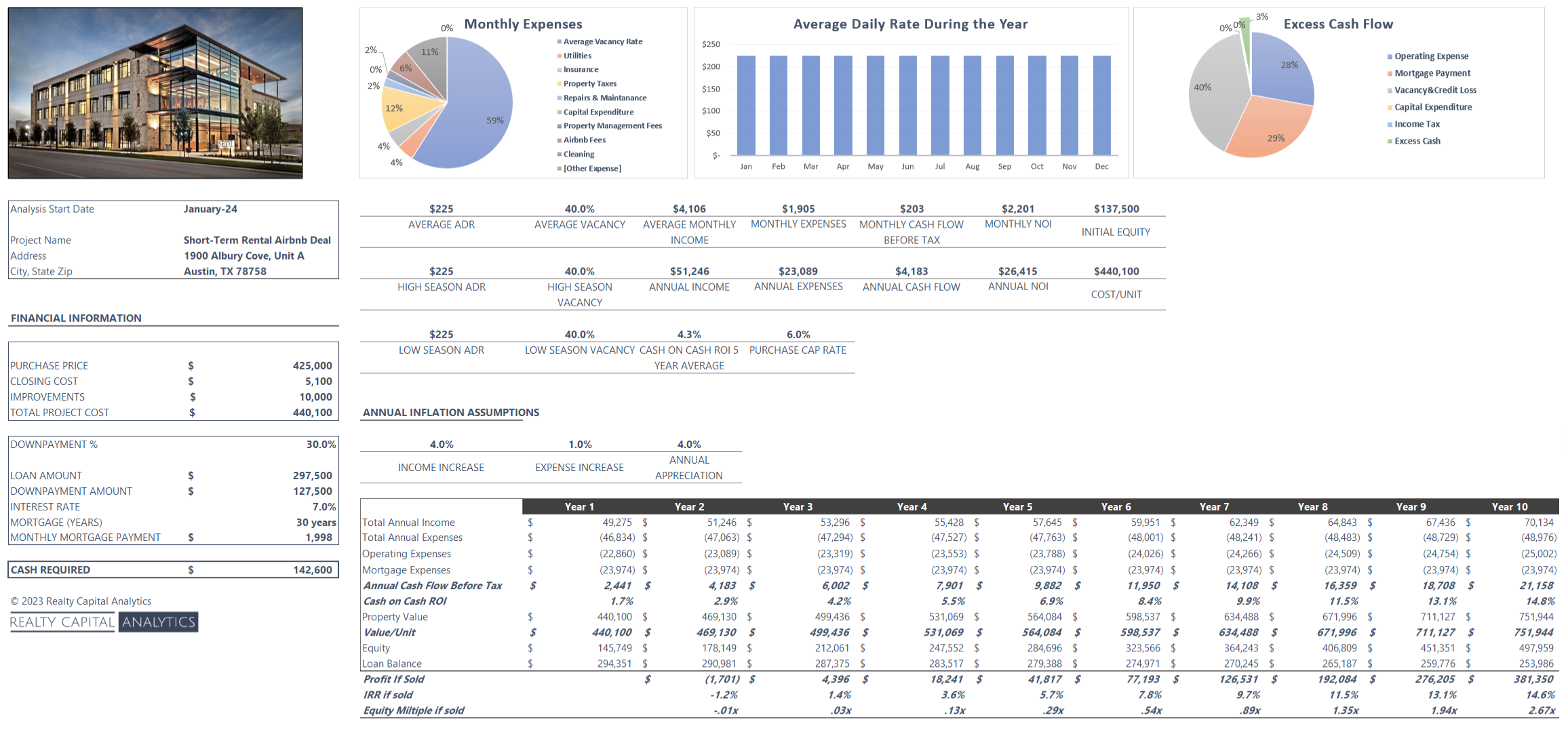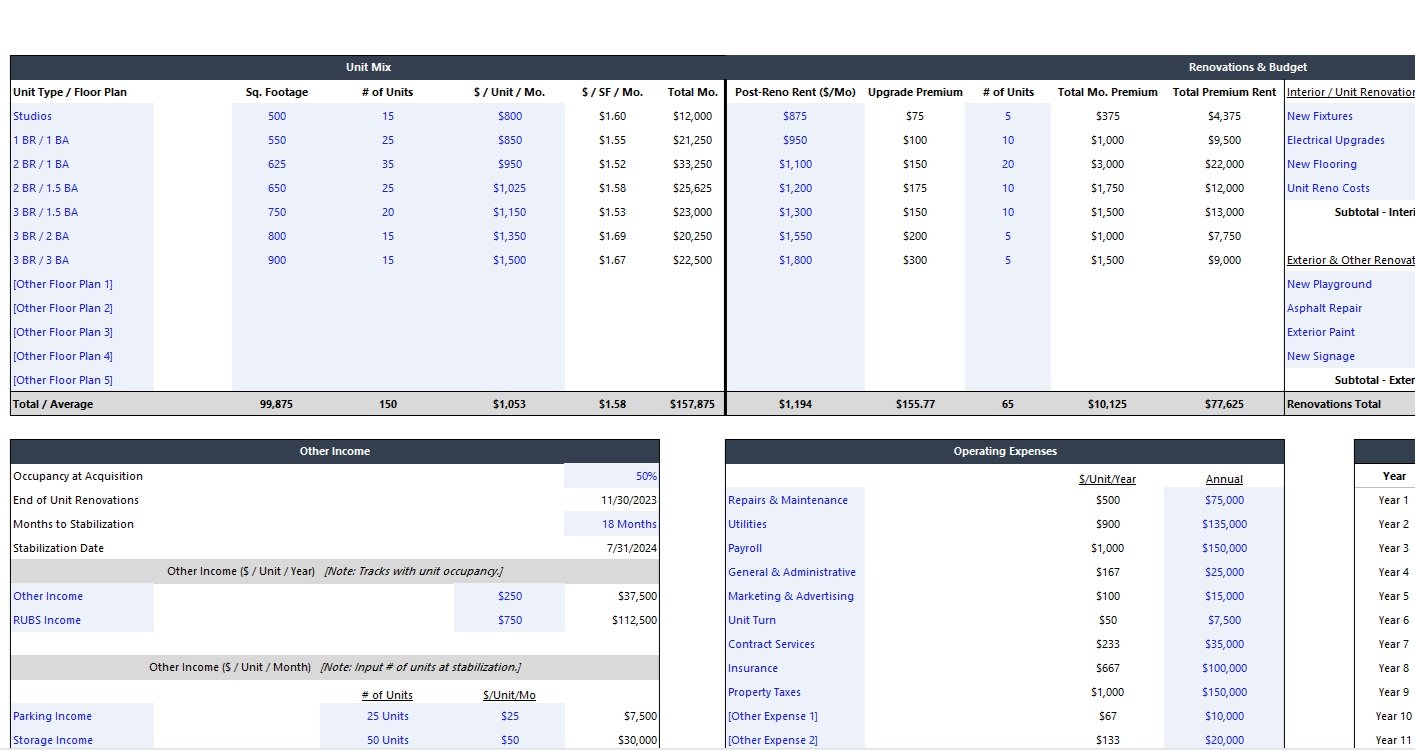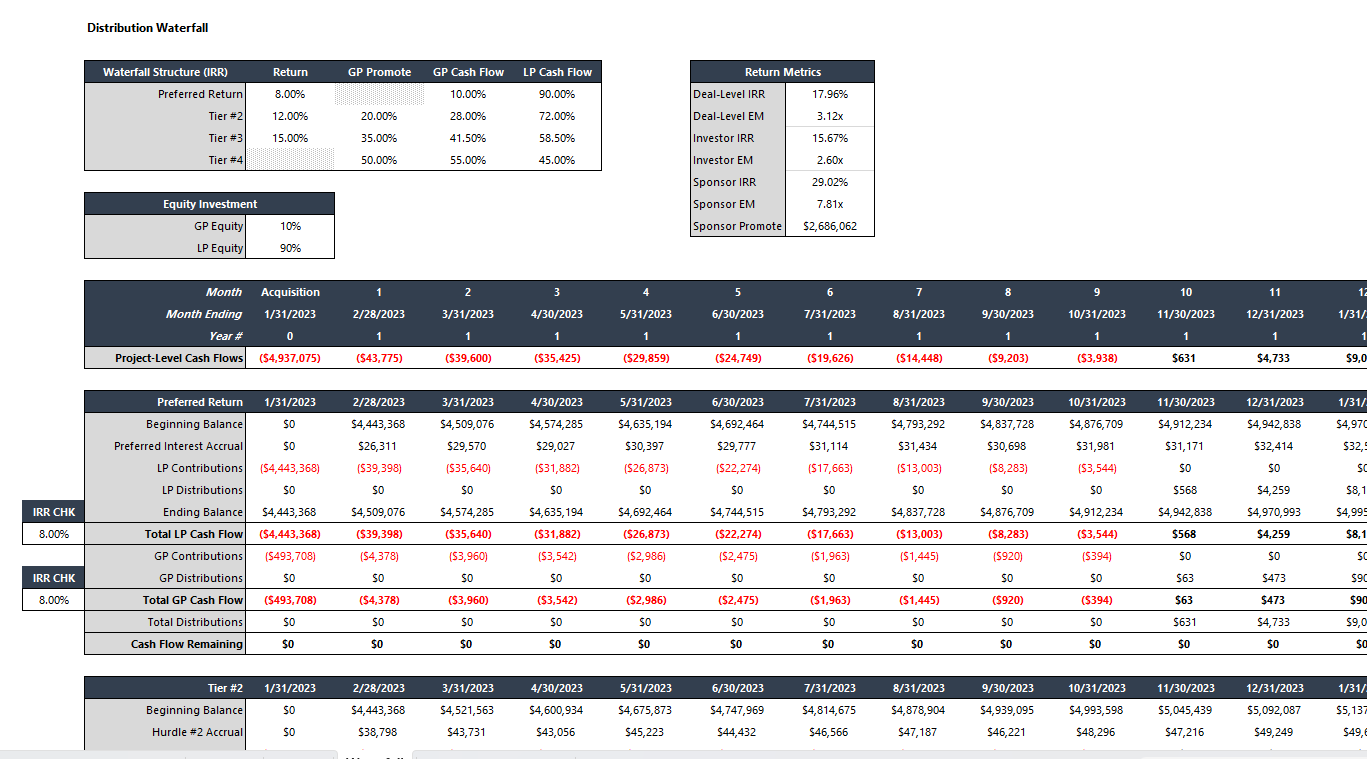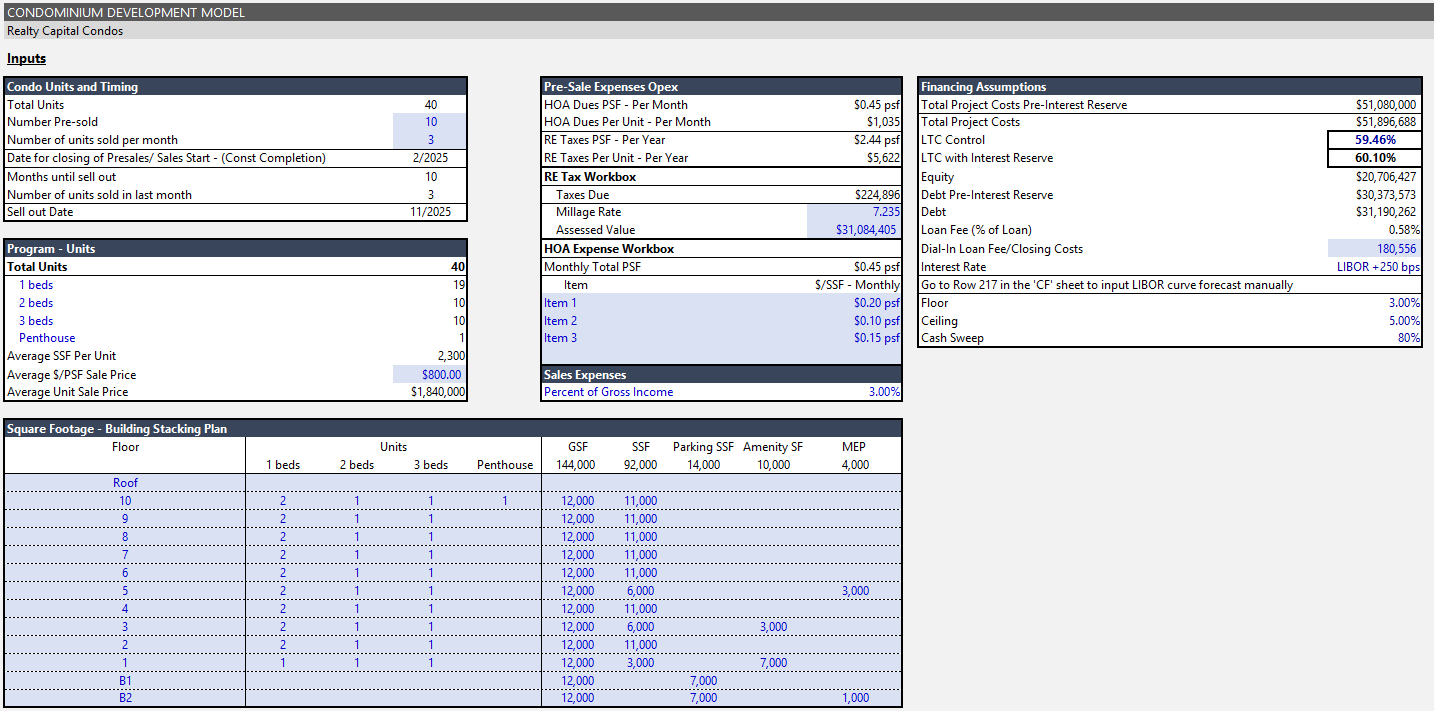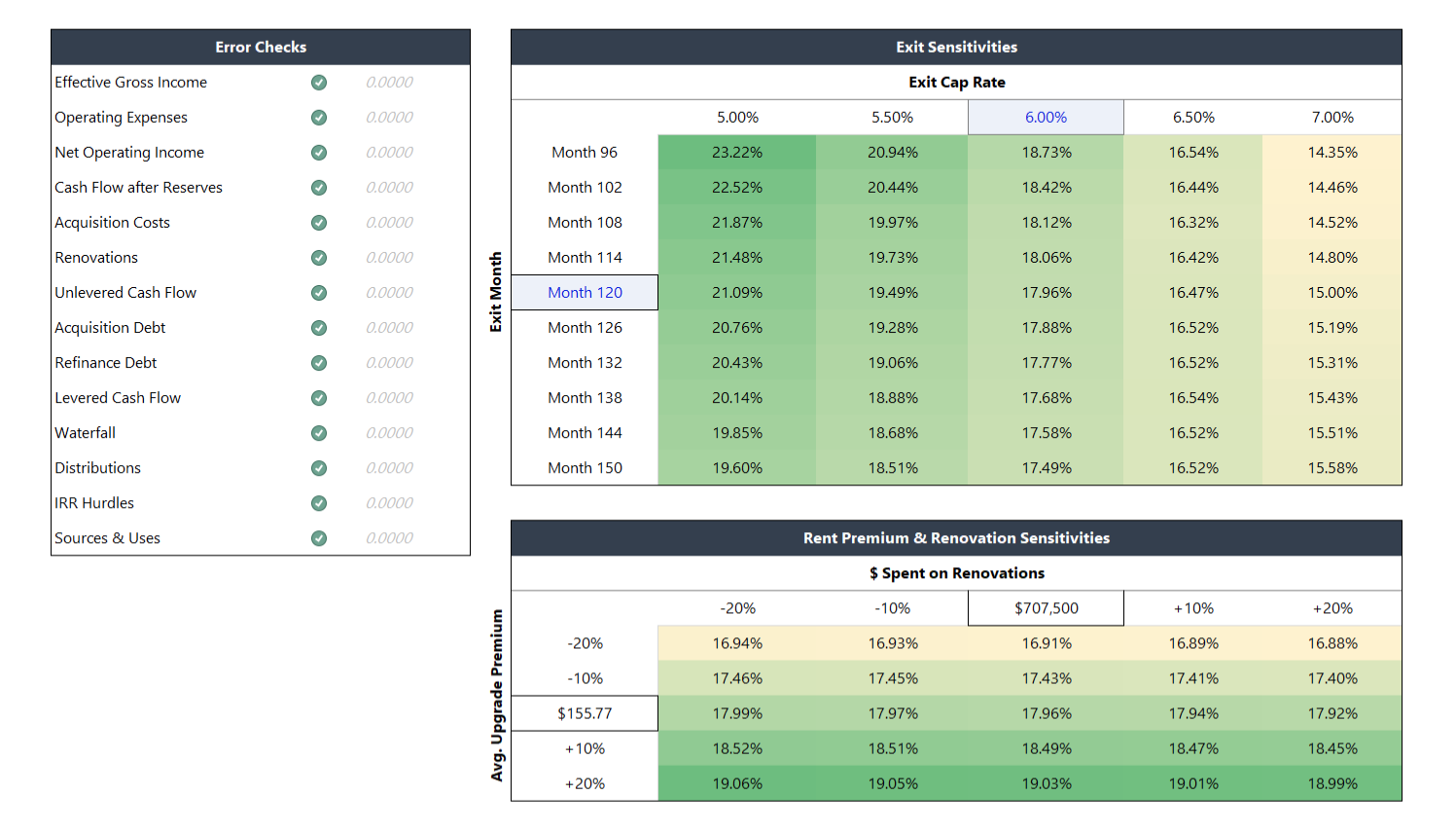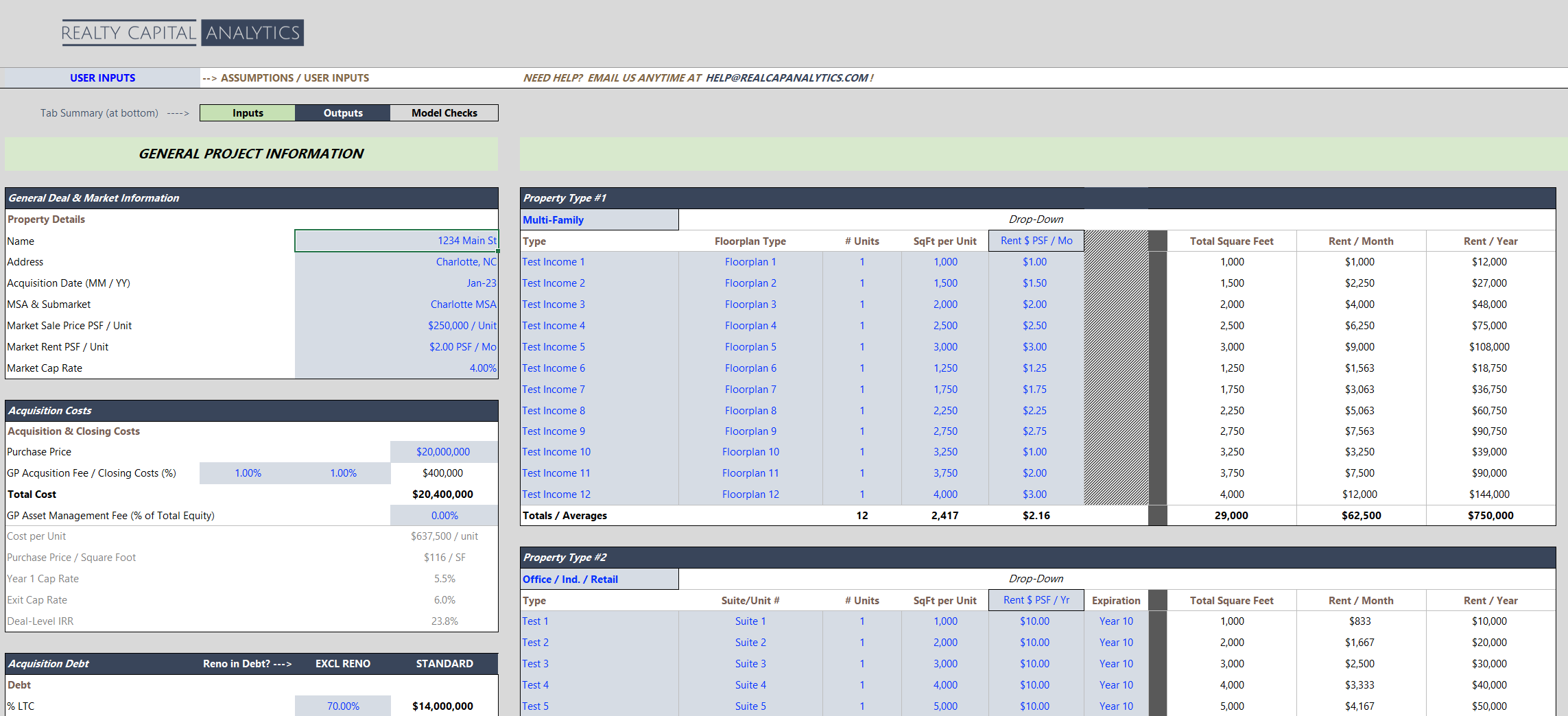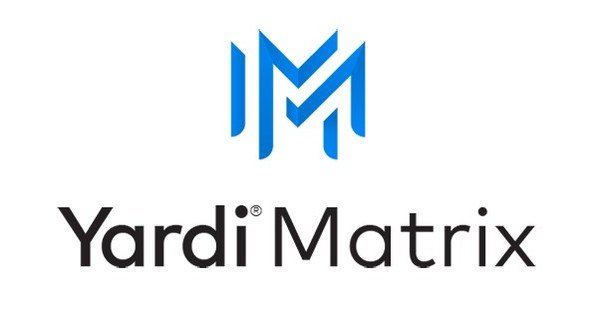Welcome to the last model you’ll ever need. Powered by AI and tailored for every real estate asset class.
Investor-ready real estate financial models built for acquisitions, developments, portfolios, and beyond.
Download the RCA® Models Platform Guide
Our Excel®-based models streamline deal analysis, optimize partnership economics, and accelerate capital formation—all from a single integrated solution. Powered by our proprietary Market Sonar® technology, our models transform real-time market intelligence into actionable underwriting insights, eliminating guesswork and enabling confident, data-driven investment decisions that drive better returns.
Submit your order, e-sign agreements, and gain instant access to your portal.
Fully audited real estate models that support billions in transactions every year.
Every Asset Class.
Every Deal Stage.
Multifamily (Market Rate, Affordable & LIHTC)
Industrial
Office
Retail
Mixed-Use
Land Development
Hotel/Hospitality
Waterfalls & Partnership Structuring
Real Estate Fund Modeling (Debt & Equity) >
Portfolio & Asset Management Models >
Townhomes
Condominiums
Self-Storage
Senior Living
Marinas
Golf Courses
Mobile Home & RV Parks
Data Centers
“Back of the Envelope” Models >
Single-Family Fix/Flip & Airbnb Models >
*RCA Models are built to easily accommodate specialized situations such as Tax Increment Financing (TIF), Tax Allocation Districts (TADs), Tax Abatements, and more. Contact us to discuss your project further.
Intuitive underwriting solutions to scale deal flow and yield better returns.
Key Model Features
✓ Fully Transparent Excel® Formulas
✓ Print-Ready Dynamic Output Pages
✓ Key Assumptions on Single Input Tab
✓ Monthly & Annual Cash Flow Details
✓ T-12 Cash Flow Analysis for Acquisitions
✓ Renovation & Construction Budgets
✓ Detailed Operating, Timing & Exit Assumptions
✓ Acquisition, Construction & Refi Debt Capabilities
✓ Gross/Net Returns Summary (IRR, EMx, Profit, Etc.)
✓ Multi-Tier JV Waterfall with Pref, Hurdles & Promotes
Explore AnalystEdge® for Extra Underwriting Horsepower
Unleash the full potential of your strategy with our consulting services designed to cover every stage of the deal life cycle.
We partner with real estate investors, developers, and private equity funds to enhance deal transparency, develop effective asset strategies, and generate superior returns. Whatever stage that your fund or deal is in, we offer specialized services and financial models designed to enhance every part of your capital stack.
Why Our Clients Love Us
“RCA’s models we’re a game changer, allowing us to be more efficient, raise more capital, and close more deals.”
Every model comes with the following:
Complete third-party audit with RCA® AuditDefense
Deal-Tested and Verified Error-Free
Free Model Orientation & Deal Consultation
Lifetime Model Support & 24/7 Access to the RCA® Client Portal
Multi-Tier Waterfall with Comprehensive Partnership Capabilities
Sponsor Advisory & Access to Syndication/Fund Services
Lifetime Model Updates as Future Versions are Deployed
One-Time License Fee for Models
Understand your model visually, and know that every corner has been audited virtually, so you can have bulletproof confidence in your numbers.
Submit your order or schedule a call, sign agreements electronically, and gain instant access to your portal. Your journey to superior financial modeling and analytics begins in minutes.
We’ve analyzed billions in real estate and work with multiple partners to build industry-leading financial models and make data-supported investment decisions. Our real estate and finance expertise spans due diligence, capital markets, and asset management strategy.
About Realty Capital Analytics
We aim to be trusted advisors in navigating the complexities of real estate investing, asset management, capital markets, and fundraising, dedicated to tailoring our services to our clients’ dynamic needs.
“Relentlessly committed to client success one deal, and one dollar at a time.”
We provide the following services to support our clients:
Excel® & Argus®-Based Financial Modeling
Acquisition & Development Modeling
Equity Waterfalls & Partnership Structuring
Property & Portfolio-Level Analysis
AI-Powered Research & Market Intelligence
Financing and Fundraising Strategy
Frequently Asked Questions
-
Real estate financial models are tools used to predict the financial performance of real estate investments through dynamic numerical scenarios. They help investors, developers, and financial institutions assess the value, risk, and return of property investments.
-
Waterfall structures in real estate dictate the sequence in which returns are distributed among investors. They typically prioritize the return of capital, followed by a preferred return, and finally split any remaining profits according to agreed-upon hurdles and promotes.
-
AI enhances real estate financial modeling by improving accuracy in forecasting and risk assessment. It allows for the processing of vast amounts of data, from market trends to economic indicators, to generate precise investment simulations. AI also facilitates scenario analysis by quickly adjusting models based on varying conditions, enabling more dynamic investment strategies and better-informed decision-making.
-
Real estate private equity refers to a form of investment where private capital is pooled to invest directly in properties or real estate projects. These investments are typically managed by private equity firms or funds that specialize in real estate markets. Investors in these funds generally include high-net-worth individuals, endowments, and institutional investors. The investment strategy can range from acquiring underperforming properties to enhance and sell for profit, to developing new properties, and managing income-generating assets. The goal is to achieve high returns which are distributed back to investors after reaching certain financial milestones, commonly through structures like waterfall models. Real estate private equity plays a crucial role in providing liquidity to the real estate market, facilitating renovations, developments, and improving property management practices to maximize asset value.
-
Institutional quality real estate models are distinguished by their depth, precision, and adherence to rigorous standards that align with professional investment practices. These models typically include detailed monthly cash flow projections instead of just annual summaries, allowing for more granular analysis and management of financial performance throughout the year. They are built to handle long-term forecasting with horizons often extending 10-15 years or more to capture the full lifecycle of real estate investments. Furthermore, these models incorporate complex sensitivity and scenario analyses to evaluate how changes in market conditions or specific investment variables affect the project's outcomes. This helps in understanding the risks and potential returns under different scenarios. Institutional models also feature sophisticated debt structuring, including senior loans, subordinate/mezzanine financing, and other forms of layered capital, which are crucial for modeling the real capital stack used in large-scale real estate projects. Additionally, institutional quality models are subject to robust auditing and field testing to ensure accuracy and reliability. This auditing process verifies every assumption, calculation, and output, ensuring the model stands up to the scrutiny of investors, financial partners, and regulatory bodies. The comprehensive nature of these models makes them indispensable tools for serious investors aiming to make informed decisions in complex and competitive real estate markets.
-
Real estate fund consultants provide expert advice on portfolio strategy, asset selection, and management. They guide investment decisions, ensuring alignment with the investor's financial goals and risk tolerance.
-
Some of a consultant’s key responsibilities include market analysis, due diligence, financial modeling, and strategic planning to maximize investment returns and mitigate risks.
-
The typical phases include capital raising, investment acquisition, asset management, and disposition. Each phase requires distinct strategies and financial planning to optimize the fund's performance.
-
Accuracy is ensured through rigorous data validation, auditing, use of real-time market inputs, continuous model testing, and scenario analysis to anticipate possible outcomes.
-
Due diligence in financial modeling involves verifying all assumptions, sourcing accurate and timely data, and rigorously analyzing financial and market risks.
-
A multi-tier JV waterfall structure involves multiple levels of distribution rules based on the return milestones achieved, which govern how profits are split among partners at different stages of the investment return process.
-
Real estate waterfalls align interests by structuring distributions so that sponsors only receive their share of profits after returning initial capital and meeting certain performance benchmarks to investors.
-
Strategies include asset diversification, strategic asset repositioning, proactive debt management, and leveraging technology for operational efficiency.
-
Common pitfalls include overly optimistic assumptions, underestimating costs, ignoring market cycle impacts, and failing to plan for liquidity contingencies.
-
Changes in interest rates, lending standards, and investment flows can alter asset valuations, affect debt service capabilities, and shift investor return expectations, necessitating model adjustments.
-
Key innovations in real estate financial modeling include the integration of advanced data analytics and machine learning for more accurate predictive modeling, the use of big data to enhance market analysis, and the application of scenario analysis tools that allow for dynamic and flexible financial forecasting. These technological advancements help in refining investment strategies and improving decision-making processes.
-
Transparency helps build investor confidence by providing clear insights into the assumptions, methodologies, and calculations used in the models. It ensures accountability and facilitates easier audits.
-
Risk management involves identifying potential risks, quantifying their impact, and implementing strategies to mitigate them, such as insurance, diversification, and hedging techniques.
-
Challenges include aligning investor interests, managing complex legal and tax considerations, and structuring flexible yet secure investment vehicles.
-
Lifecycle events like acquisitions, refinancing, or dispositions require model updates to reflect new financial structures, revenue streams, and changes in market conditions.


